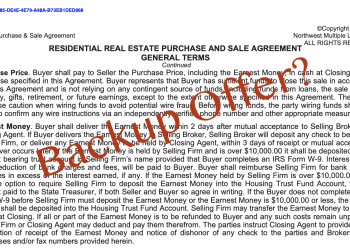Will there be a housing recession? Are we in the beginning of a housing recession, and if so, how long will it last and how deep will it go? The answer to this question or to these questions involves an analysis into a number of complex areas of study, and while we have national experts who have spent a lifetime in one area, few can claim to be experts in all areas necessary for a comprehensive analysis.
What areas of study are required to do justice to these questions about recession? Starting with the big picture, there are several negative variables currently at play, including the frailty of the International banking system, the relative weakness of national currencies, the imbalance of trade, unsustainable debt, the fragility of the largest economies of the world, political instability, the threat of multiple wars, the looming danger of worse pandemics.
On a national level in the U.S. the list of variables that threaten a recession are as long as any nation, including national and business and personal debt that has moved beyond unsustainable, the manipulative printing of trillions in fiat currency, a Federal Reserve that has little power to save the economy, massive speculation on Wall Street and in real estate that has driven prices into the stratosphere, and political policies at the national and state levels that are no longer governed by rational thinking but by greed, money, and power. In the next presidential election, Americans are likely to be faced with the a choice between two candidates, neither of whom have the knowledge or wisdom to save a nation.
So what is going to happen between now and the end of this calendar year, and what will 2023 bring? No expert or panel of experts can tell us definitively, because the list of variables that must be considered creates a million permutations. Statistically it is virtually impossible to assign probabilities to various economic outcomes. What can we say that does have a ring of reality or of statistical likelihood?
Where is wisdom? Here is what I think we can say. When times like these present us with so many difficult possibilities, and when events can go in so many directions, creating even more possibilities for our future, we would be wise to be cautious. What does “cautious” look like right now? Cautious in a time like this would include a bullet list, one that sounds like it could be from the book of Proverbs.
- Do not take unnecessary risks in uncertain times.
- Timing is everything, so consider carefully the timing of all buying and selling decisions.
- Uncertainty is your subconscious saying it may be better to wait than to pull the trigger now.
- The older we get, the more caution we must exercise, because we cannot easily start all over again as we could when we were young.
- Big mistakes in our 50s or 60s can devastate our financial stability for the remainder of our lives, so we cannot afford a big mistake as we transition into retirement.
- One major wrong decision can ruin us financially after a lifetime of hard work and careful investing.
- The safest financial position to be in is “debt free.”
- Beware of so-called professional consultants or “Registered Financial Advisors,” and Realtors. The majority of these professionals tend to give their clients precisely the wrong advise when markets are declining, and especially before markets crash. When markets fall, they tell their clients to either buy more because “this is a buying opportunity,” or they use the standard line, “Oh no, now is not a time to sell. Remember, you’re invested for the long term. Markets go up and they go down, so now is not a time to sell. It’s a time to hold fast. The market will come back.” Until it doesn’t. In past recessions many retirees have taken their advisor’s advice while their retirement accounts lost 30%, then 50%, then 70%. And their advisor was still telling them not to sell.1For example, if one has invested in a retirement account for 30 or 40 years in mutual funds or ETFs or other diversified funds on Wall Street, and the financial markets collapse as they have many times in the past, a retirement fund could easily loose 50% to 70% of its entire value. What’s the lesson from history? There is a time to move funds out of such high risk investments.
- Choose your advisors or consultants with great discernment, and do not obey them blindly. It’s your money and your future, not theirs.
- The timing of your housing decisions, when to sell and when to buy, can make or break you, so be cautious. Be especially careful when choosing a listing agent or a buyer’s agent. No matter the state of the housing market, Realtors tend to regurgitate their favorite clause, “Buy, buy, buy.”
- Even in a market downturn or a housing recession, buying or selling can be wise, but such decisions must be guided by deep knowledge of real estate, the market, and timing. A recession is not a time to hire inexperienced Suzy Realtor or Tommy Realtor to give you advice on the biggest financial decisions of your life.2And by experience, I do not mean years. A person can have 20 years in a profession and still be incompetent.
Do not misunderstand this bullet list. It does not conclude that you should not buy or sell now. Unlike most buyer’s agents who are saying, “Buy, buy, buy,” and most listing agents who are telling their prospective clients, “Sell, sell, sell,” I’m not riding either of those trains.
I’m suggesting that wisdom ought to rule the timing of your buying and selling decisions.
For some, that will mean listing and selling now in a particular market, but for others it will not. For some wisdom would suggest that now is the time to buy a particular home at a reasonable price in a particular neighborhood in a particular market and region, but for others it would not.
One must factor in the personal circumstances in each person’s life, too. For example, a person who recently sold a home in California and plans to retire in a rural area like Sequim, Washington, may find themselves without a place to live in California, or in a place where rent is unreasonably high, and it may behoove them to purchase a home in Sequim in the near future even though they think prices may decline somewhat further in the Sequim market. Fluctuations in housing prices will mean less to a retiree who plans to live in the home for the rest of their life, or at least for a couple of decades, than to a young couple who may have to sell in a few years.
You would be wise to retain a knowledgable, competent, and professional real estate broker in uncertain times like these with whom you can have intelligent discussions about your buying or selling decisions, about the state of the market where you are selling and the state of the market where you may be buying, . . . and about your timing.
Here’s a video I produced recently that is not as substantive as this article, but does demonstrate how price reductions in the Sequim market are indicating we are in a market decline.
Last Updated on August 26, 2022 by Chuck Marunde



































